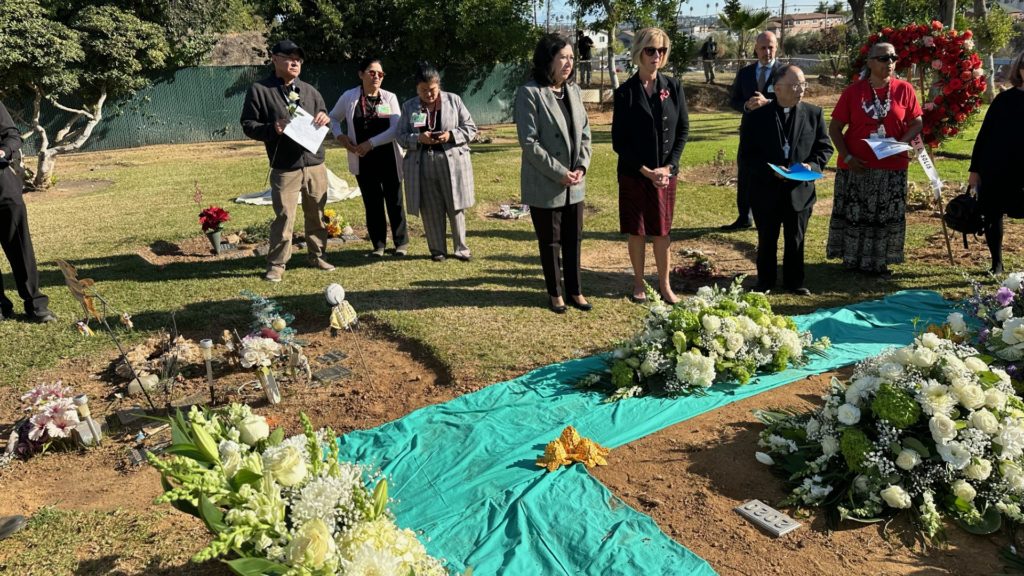A few years ago, starting to contemplate my death and burial, I happened upon a cemetery in a small Central Coast town where I have friends. I called one day to inquire about the cost of a plot and the guy who answered could not get his mind around the fact that I didn’t live in the town, nor had I grown up in the town, nor did I have any particular ties with the town other than having visited it over the years. Finally he could no longer hold himself in. “Ain’tcha got no FAMILY?” he blurted.
Well, like many of us, yes and no. Let’s just say I read “The Unclaimed: Abandonment and Hope in the City of Angels” (Crown, $30), by Pamela Prickett and Stefan Timmermans, with special attention.
Prickett is associate professor of sociology at the University of Amsterdam. Timmermans, whose interest lies in forensic death investigations, is a professor of sociology at UCLA.
Both become fascinated by the fact that approximately 1,600 people die in the greater Los Angeles area each year without a single person to claim their bodies or remains.
Who are these people? And why do they end up where they do?
In an effort to unravel the mystery, the authors decided to follow four individuals who died in LA between 2012 and 2019 — some destitute, some not; some with relatives, some without.
They cold-called, knocked on doors, followed county employees in their workplaces, conducted interviews, and exhaustively fact-checked.
Civilizations across the ages, they point out, have mourned the dead and gone to great lengths to obtain control of the body and arrange a decent burial. This very human impulse is even embedded in our legal code: the common law “right of sepulcher.”
It used to be that those who ended up in a potter’s field were almost invariably indigent. Nowadays it’s way more common for people “of means” to die alone and unmourned: thus, the newer term is “the unclaimed.”
If you die like this in LA, the county cremates your body and stores the ashes for three years in a brown plastic box (or an envelope if you’re a fetus or tiny infant) in case someone comes along who’s willing to pay the approximately $400 claim fee.
If no one does — and they usually don’t — once a year the ashes are dumped in a mass grave in the four-acre “potter’s field” located in an unattractive corner of Boyle Heights’ Evergreen Cemetery. In 2017, there were 1,461 boxes and envelopes.
How did we come to the point where almost a quarter of those over 65 are considered “socially isolated”? How has it come to pass that in the first decade of the 21st century, 114,000 Americans died unclaimed?
If LA County is any indicator, it’s not for lack of trying. Three distinct, though often overlapping, county agencies handle the bodies and the estates of the dead.
The Los Angeles County Medical Examiner-Coroner investigates suspicious or indeterminate deaths, signs the death certificate if (as is often the case), the decedent was outside the health care system, and notifies the next of kin.
The Office of Decedent Affairs handles run-of-the-mill deaths that occur, for example, in nursing homes and hospitals, and oversees the Boyle Heights county crematorium and cemetery.
The public administrator specializes in finding next of kin and assets.
The labyrinthine rules, waiting periods, claim fees, and loopholes within and among the three agencies made my head spin.
What came through was that in any system: 1) There are always one or two people who are conscientious, take their jobs seriously and personally, and know they are contributing to the greater good, whether or not anyone ever notices. 2) One or two people — outliers who often have few resources themselves — will emerge from the woodwork, wade through the red tape, and find a way to establish a labor-of-love way to honor and serve humankind.
Elissa Davey, for example, a woman from San Diego County, started a project called The Garden of Innocence where unclaimed babies — whether abused, murdered, abandoned, or found in a trash can — can receive a loving and decent burial.
Doyle Tolbert, a Vietnam vet, started an organization called Veterans Without Family that goes to great lengths to identify indigent deceased as veterans and to provide them with a decent casket and military honors burial.
Father Chris Ponnet, director of spiritual care at Los Angeles County-USC Medical Center, faithfully presides each year over an open-to-the-public ecumenical service for LA’s unclaimed dead.
Near the end of the book, Prickett describes her sorrowful estrangement from her own father, then wonders: “At the heart of my dilemma — and those of other estranged families: Where do our obligations to family begin and end?”
Excellent question: in fact, the breakdown of the family — with its shared belief system, rituals, and responsibilities; its capacity, ideally, to care for its weak, sick, and elderly; its support of ongoing life — is clearly responsible, in large part, for the skyrocketing levels of “lonely deaths,” as the Japanese call them, around the globe.
Which brings me back to that cemetery on the Central Coast.
I’ve made other plans — and I comfort myself with this: Not a sparrow falls but what the Father knows. And contrary to the wisdom of the world, at the end of the age what will matter is not how much others loved, served, and mourned us.
What will matter is how much, in our poverty, we loved and served others.

